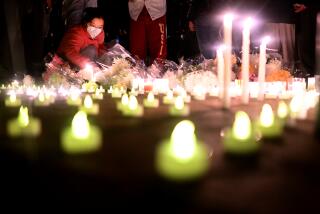U.N. Voices Concern Over Rise in Alleged Abuse of Chinese Muslims
- Share via
BEIJING — The United Nations’ top human rights official told Chinese leaders Friday that efforts to combat terrorism must not infringe on the human rights of China’s Muslim minorities.
U.N. High Commissioner for Human Rights Mary Robinson told officials that, since the Sept. 11 attacks in the United States, her office had seen an increase in allegations of summary execution, imprisonment and torture of ethnic Uighurs in the Xinjiang region in northwestern China.
“The volume of complaints, and the seriousness of them, has gone up in recent months, and I find that very worrying,” Robinson told a news conference.
She warned that trying to fight terrorism by “cutting corners” on human rights could breed a sort of terrorism.
Since Sept. 11, China has stepped up its crackdown on Uighur separatists pushing for an independent state of East Turkestan.
The authorities recently sentenced several Uighurs to death and others to prison terms for separatism, according to official media reports. Officials accuse the separatists of a series of bombings and killings in Xinjiang over the last decade.
But human rights groups allege that the crackdown has violated the rights of peaceful Uighurs who legitimately seek more autonomy from Beijing.
At home, Chinese law enforcement officials group separatists with political dissidents and common criminals--targets of the “strike hard” anti-crime campaign.
Abroad, Beijing has increased diplomatic efforts to portray Uighur separatists as a legitimate target of global anti-terrorism efforts.
Robinson said Vice Premier Qian Qichen claimed that about 1,000 Chinese Uighurs had received training in Afghanistan from Osama bin Laden’s Al Qaeda terrorist network.
But Qian added that China strictly distinguishes the separatists from the rest of the roughly 10 million Chinese Muslims in the Xinjiang region, Robinson said.
Robinson portrayed the alleged abuses against Chinese Muslims as symptomatic of widespread violations by law enforcement personnel pushing for quick criminal convictions.
She called on China to make good on its 1999 invitation for top U.N. torture investigator Nigel Rodley to visit the country. China has so far refused Rodley’s terms for the visit: unannounced visits to prisons of his choice and interviews with prisoners out of earshot of officials.
During her two-day visit, Robinson expressed to President Jiang Zemin and other officials her concern about the human rights of Tibetans, journalists, dissidents and followers of the Falun Gong spiritual movement.
She also pressed for the early release from prison of veteran democracy activist Xu Wenli, whose wife says he is ill.
Robinson signed an agreement to cooperate with China on increasing human rights research, as well as training for Chinese judges, lawyers and prison administrators.
She defended the lack of progress on specific cases, saying that progress in “embedding a culture of human rights” in China is a slow, incremental process.
Although China is increasingly receptive to cooperation on human rights issues, as for addressing “serious problems in the system and . . . individual cases,” she said, “there is much less progress to show, and it’s not all in the right direction.”
More to Read
Sign up for Essential California
The most important California stories and recommendations in your inbox every morning.
You may occasionally receive promotional content from the Los Angeles Times.













